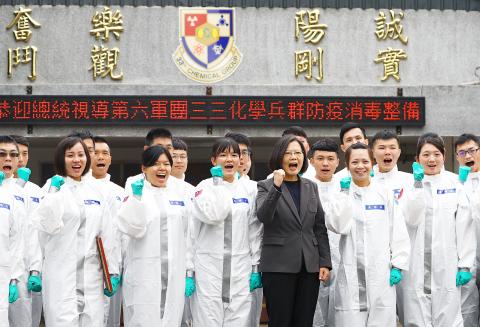Premier Su Tseng-chang (蘇貞昌) yesterday promoted the Central Epidemic Command Center (CECC) from a “level 2” to a “level 1” government entity to streamline communication and better contain the spread of COVID-19, while Minister of Health and Welfare Chen Shih-chung (陳時中) would continue to serve as head of the center.
Chen at the weekly Cabinet meeting suggested that Su promote the CECC to a “level 1” entity, Executive Yuan spokeswoman Kolas Yotaka said, adding that Su accepted the suggestion and reappointed Chen as head of center.
With the COVID-19 outbreak escalating around the world, “the best defense for Taiwan is a good offense, which is the front line of disease prevention to preempt a major outbreak,” Su said.

Photo: CNA
Despite its proximity to China, the nation has been able to restrict COVID-19 to “minor community outbreaks,” mostly contagion within families, which shows that Chen is the most fitting candidate to serve as CECC head, Kolas said in response to queries as to why the premier had chosen Chen instead of himself for the job.
The promotion to “level 1” would facilitate the distribution of resources and communication between relevant government agencies, whose deputy ministers would be required to be on standby at the CECC at all times to attend regular meetings, Kolas said.
Chen told a later news conference that he had made the suggestion after seeing other nations accumulate more than 1,000 confirmed COVID-19 cases in less than five days.
Chen thanked Su for having faith in him and pledged to take preemptive measures to contain the coronavirus.
Hospitals are to set aside more wards to be used as isolation wards in the case of an emergency, Chen said, adding that this would likely increase the nation’s capacity to screen the disease to 2,450 people per day starting next week.
Earlier, with the Tomb Sweeping Holiday approaching, Su ordered government agencies to inform Taiwanese businesspeople and students returning from affected nations and regions to monitor their health at home for 14 days upon their arrival.
They should be informed upon boarding their flights of the penalties they would face if they leave home during the quarantine period, he said.
Su also approved a plan by Vice Premier Chen Chi-mai (陳其邁) for the nation to set up an extra 30 mask production lines.
The Ministry of Economic Affairs is carrying out a plan to add 60 production lines by March 10, which would bring the nation’s daily production to about 10 million masks, Small and Medium Enterprise Administration Director-General Ho Chin-tsang (何晉滄) said.
The 30 extra lines would further boost the nation’s mask production to between 12 million and 13 million per day, Ho said, without giving a time frame for when the additional lines would be completed.
Additional reporting by Lin Hui-chin

DAREDEVIL: Honnold said it had always been a dream of his to climb Taipei 101, while a Netflix producer said the skyscraper was ‘a real icon of this country’ US climber Alex Honnold yesterday took on Taiwan’s tallest building, becoming the first person to scale Taipei 101 without a rope, harness or safety net. Hundreds of spectators gathered at the base of the 101-story skyscraper to watch Honnold, 40, embark on his daredevil feat, which was also broadcast live on Netflix. Dressed in a red T-shirt and yellow custom-made climbing shoes, Honnold swiftly moved up the southeast face of the glass and steel building. At one point, he stepped onto a platform midway up to wave down at fans and onlookers who were taking photos. People watching from inside

A Vietnamese migrant worker yesterday won NT$12 million (US$379,627) on a Lunar New Year scratch card in Kaohsiung as part of Taiwan Lottery Co’s (台灣彩券) “NT$12 Million Grand Fortune” (1200萬大吉利) game. The man was the first top-prize winner of the new game launched on Jan. 6 to mark the Lunar New Year. Three Vietnamese migrant workers visited a Taiwan Lottery shop on Xinyue Street in Kaohsiung’s Gangshan District (崗山), a store representative said. The player bought multiple tickets and, after winning nothing, held the final lottery ticket in one hand and rubbed the store’s statue of the Maitreya Buddha’s belly with the other,

‘NATO-PLUS’: ‘Our strategic partners in the Indo-Pacific are facing increasing aggression by the Chinese Communist Party,’ US Representative Rob Wittman said The US House of Representatives on Monday released its version of the Consolidated Appropriations Act, which includes US$1.15 billion to support security cooperation with Taiwan. The omnibus act, covering US$1.2 trillion of spending, allocates US$1 billion for the Taiwan Security Cooperation Initiative, as well as US$150 million for the replacement of defense articles and reimbursement of defense services provided to Taiwan. The fund allocations were based on the US National Defense Authorization Act for fiscal 2026 that was passed by the US Congress last month and authorized up to US$1 billion to the US Defense Security Cooperation Agency in support of the

HIGH-TECH DEAL: Chipmakers that expand in the US would be able to import up to 2.5 times their new capacity with no extra tariffs during an approved construction period Taiwan aims to build a “democratic” high-tech supply chain with the US and form a strategic artificial intelligence (AI) partnership under the new tariffs deal it sealed with Washington last week, Taipei’s top negotiator in the talks said yesterday. US President Donald Trump has pushed Taiwan, a major producer of semiconductors which runs a large trade surplus with the US, to invest more in the US, specifically in chips that power AI. Under the terms of the long-negotiated deal, chipmakers such as Taiwan Semiconductor Manufacturing Co (TSMC, 台積電) that expand US production would incur a lower tariff on semiconductors or related manufacturing